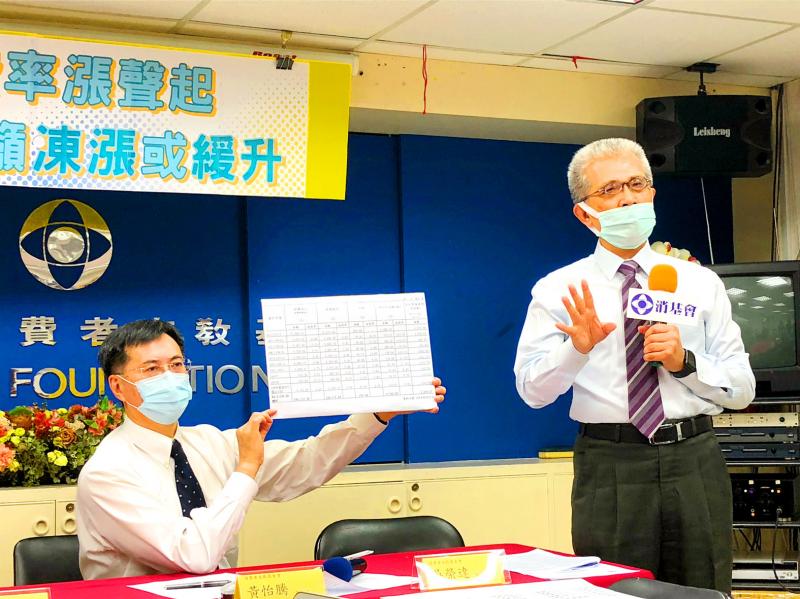The Consumers’ Foundation yesterday called on the government to suspend or lower its planned increase of National Health Insurance (NHI) premiums in light of economic woes felt in the wake of the COVID-19 pandemic.
The National Health Insurance Administration (NHIA) is considering raising premiums from 4.69 percent to 5.52 or 5.55 percent.
Income for businesses and ordinary people worldwide have taken a beating from the pandemic, the foundation said, urging the government to “feel the suffering of the people” and either freeze or lower the premium hike.

Photo: Lo Chi, Taipei Times
Article 3 of the National Health Insurance Act (全民健保法) stipulates that the government “should at least shoulder 36 percent of the remainder of the annual insurance budget minus promulgated revenues,” foundation deputy director-general Wu Jung-ta (吳榮達) said.
With the NHI’s finances in a sorry state and the end of the pandemic uncertain, the government should show compassion for the challenges people are enduring and bear a larger proportion of health insurance premiums, Wu said.
The government should budget for health expenditures and avoid adding to the burden placed on the NHI by leaving payments up to the agency, he added.
As for expanding revenue channels for the NHI, Wu pointed to Article 76 of the act, which allows for a “social health and welfare surcharge” to be placed on sales of alcohol and tobacco to generate revenue for the NHI reserve fund.
A tobacco surcharge has been implemented for many years, but an equivalent tax on alcohol has not yet been levied, he said.
Wu also recommended that the government consider emulating other nations by imposing a sugar tax, which could raise awareness of the dangers associated with consuming excessive amounts of sugar and provide a significant revenue source for the NHI.
According to the NHI’s estimated budget for next year, if premiums remain unchanged and additional funds are not raised elsewhere, the NHI reserve fund would fall below safe levels by the end of the year.
Officials therefore plan to discuss raising premiums during the NHI Committee meeting on Friday next week.
At this point, as raising premiums for next year appears inevitable, the government should at least consider limiting the premium to 4.91 or 5.17 percent at most, the amount it used to be, Wu added.

The Ministry of Economic Affairs has fined Taobao NT$1.2 million (US$36,912) for advertisements that exceed its approved business scope, requiring the Chinese e-commerce platform to make corrections in the first half of this year or its license may be revoked. Lawmakers have called for stricter enforcement of Chinese e-commerce platforms and measures to prevent China from laundering its goods through Taiwan in response to US President Donald Trump’s heavy tariffs on China. The Legislative Yuan’s Finance Committee met today to discuss policies to prevent China from dumping goods in Taiwan, inviting government agencies to report. Democratic Progressive Party Legislator Kuo Kuo-wen (郭國文) said

The Ministry of Economic Affairs has fined Taobao NT$1.2 million (US$36,900) for advertisements that exceeded its approved business scope and ordered the Chinese e-commerce platform to make corrections in the first half of this year or its license would be revoked. Lawmakers have called for stricter supervision of Chinese e-commerce platforms and more stringent measures to prevent China from laundering its goods through Taiwan as US President Donald Trump’s administration cracks down on origin laundering. The legislature’s Finance Committee yesterday met to discuss policies to prevent China from dumping goods in Taiwan, inviting government agencies to report on the matter. Democratic Progressive Party

Taiwan and its Pacific ally Tuvalu on Tuesday signed two accords aimed at facilitating bilateral cooperation on labor affairs, according to Taiwan’s Ministry of Foreign Affairs (MOFA). The governments inked two agreements in Taipei, witnessed by Foreign Minister Lin Chia-lung (林佳龍) and visiting Deputy Tuvaluan Prime Minister Panapasi Nelesone, MOFA said in a news release. According to MOFA, the agreements will facilitate cooperation on labor issues and allow the two sides to mutually recognize seafarers’ certificates and related training. Taiwan would also continue to collaborate with Tuvalu across various fields to promote economic prosperity as well as the well-being of their

Sung Chien-liang (宋建樑), who led efforts to recall Democratic Progressive Party (DPP) Legislator Lee Kun-cheng (李坤城), was released on bail of NT$80,000 today amid outcry over his decision to wear a Nazi armband to questioning the night before. Sung arrived at the New Taipei District Prosecutors’ Office for questioning in a recall petition forgery case last night wearing a red armband bearing a swastika, carrying a copy of Adolf Hitler’s Mein Kampf and giving a Nazi salute. Sung left the building at 1:15am without the armband and covering the book with his coat. Lee said today that this is a serious